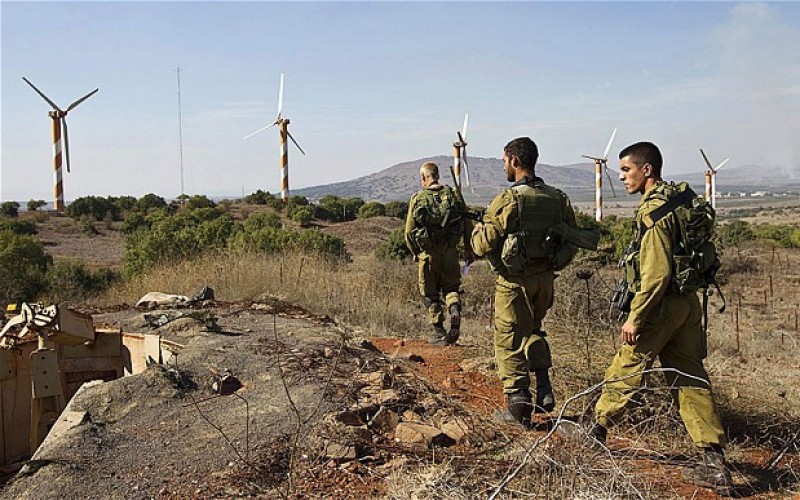The Syrian Civil War is intensifying along the border with Israel. This will upset the political balance of the region and will impact the economy of the Golan Heights with new short and long-term political risk.

For decades, the Israeli-controlled Golan Heights have been relatively calm. Internationally recognized as part of Syria, the strategic and resource rich region was captured by Israel from Syria during the Six Day War in 1967. A recent spike in violence indicates that the local political economy may be facing its greatest upheaval in decades.
The region south of Damascus has been in the hands of the factions under the umbrella of the Free Syrian Army (FSA) and Jabhat Al-Nusra (JN). An ongoing advance into this area by Assad’s Syrian Arab Army (SAA) led by Hezbollah began this February. This advance, coupled with the deadly exchange between the Israeli Defense Forces (IDF) and Hezbollah, shows that the Golan Heights is entering a dangerous new phase.
Economic backlash in the Golan Heights
The Golan is an important economic hub for Israel. Agriculture and tourism are major components of the territory’s resources along with a growing energy sector.
The EU placed restrictions on the import of Israeli agricultural goods produced beyond the Green Line. Further EU policies could jeopardize Israel’s $3 million export trade. Israel’s wine scene has also begin to attract international interest and investment. The Golan Heights Winery was among the first in Israel to kickstart thistrend. Another Golan-based business, Pelter Winery, yields 100,000 bottles annually.
During the peak of Israel’s winter season, the Mt. Herman Ski Resort has seen up to 10,000 visitors. Following the recent clashes, nearby hotels and Bed and Breakfast Inns reported 80 percent of bookings were cancelled. Eran Bar-On, who runs the Kfar Giladi Hotel near the Lebanese border, explained to Haaretz that the perception in the rest of Israel is to view the Golan Heights as a whole when security problems arise. The Mt. Herman Ski Resort is again operational after a one day evacuation.
For years, bureaucratic delays have hampered Israel’s emerging wind energy production. That is changing now. The Ministry of National Infrastructures, Energy, and Water Resources just issued a license to Eurocom Group’s subsidiary Enlight Renewable Energy Solutions for three wind power stations capable of generating 400 megawatts. One of the three stations, the Vale of Tears project, will consist of 34 wind turbines and is expected to earn NIS 110 million in revenue. The project is expect to begin construction in 2015.
Other energy resources, such as oil, are also a critical factor in the future of the Golan Heights.US-based company Genie Energy has faced multiple legal challenges on its attempts to search for oil in the border region. Genie has estimated the region contains up to 40 billion barrels of untapped oil.
Israel has searched for other sources besides the Leviathan fields in the Mediterranean to lessen its reliance on energy imports. The risks posed to the local water supply and environment, as well as the current legal status of the land, compound the problems of drilling.
Afek Oil and Gas, a subsidiary of Genie, has been granted a license for exploratory drilling which will continue over the next three years.
Israeli politics and security
Memories of the 2006 war with Hezbollah linger in this region. Fear of the group replicating the tunnel strategyof Hamas is prevalent among Israelis. Fear of rising Sunni extremism in Syria is pushing the Druze in the Golan Heights towards greater loyalty to Israel.
Syrian civilians as well as fighters from both the regime and the rebel groups regularly cross into Israeli-controlled Golan for medical treatment. Both Alawites and Druze on either side of the border remain cautious about their loyalties to the Assad regime. In the nearby Syrian As-Suwayda Governorate, local Druze are becoming more vocal about their grievances against the Syrian government.
Early Israeli elections are set for March 17, 2015. The security of the Golan Heights is a deep and bitter issue in this election. The center-left coalition Zionist Union leaders Isaac Herzog and Tzipi Livni have adopted the same hawkish rhetoric on the status of the Golan Heights as the right-wing Likud party.
The centrist Yesh Atid party founded by former Finance Minister Yair Lapid is turning into a significantchallenger ahead of the March election. Mr. Lapid recently suggested a diplomatic push could lead to the international recognition of Israel’s annexation of the Golan.
The issue of national security and defense will be paramount in the election. However, if Hezbollah is successful in routing the FSA, its hard-fought victory could result in the permanent presence on the Syrian side of the border, especially with the SAA focused on other parts of Syria. This would lead to a new unknown quantity in the ongoing Israeli-Hezbollah struggle on the border and throw the economic development into question.
Though Hezbollah is hesitant to engage Israel in a full-scale war while tied up in Syria, it may turn its focus back to Israel after the civil war. This would be to restore its prestige in the Arab world which has been heavily damaged due to its support for a regime that has suppressed Sunni Muslims. The Golan Heights, once a bargaining chip for peace with Syria, will stay with Israel into the foreseeable future – and with it protracted insecurity.
sourche: http://globalriskinsights.com/2015/02/increased-security-risk-ahead-for-golan-heights/
Δεν υπάρχουν σχόλια:
Δημοσίευση σχολίου